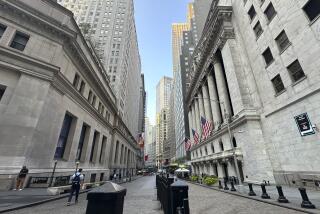Hot Job Market Fuels Consumer Confidence
- Share via
NEW YORK — Confidence in the U.S. economy soared in May as irrepressible consumers shrugged off rising interest rates and Wall Street volatility and instead focused on the buoyant job market, the Conference Board said Tuesday.
The board’s consumer confidence index, a closely watched gauge of future economic activity, rebounded to a four-month high of 144.4 in May from April’s upwardly revised flat reading of 137.7.
“With unemployment at a 30-year low and the short-term Conference Board forecast projecting favorable labor market conditions, confidence is expected to remain strong through the summer,” said Lynn Franco, director of the board’s consumer research center.
“Volatile financial markets and interest rate hikes are not expected to have a significant impact on consumers’ spirits,” she added.
The consumer confidence report is closely watched by economists and financial markets for signs of future trends in consumer spending, which makes up about two-thirds of America’s economy.
The indicator had declined for three months before May as wild gyrations in the stock market took their toll on consumer sentiment. Economists had expected another decline in the index in May from a revised 137.7 in April.
But economists said Tuesday that despite recent steep U.S. stock market declines, Americans felt reassured by rising wages and a powerful sense of job security; unemployment eased to 3.9% in April, its lowest level in 30 years.
“The unemployment rate is by far the key determinant of consumer confidence, not stock prices,” said David Orr, chief economist at First Union Corp. in Charlotte, N.C.
“To the broad cross-section of middle-class Americans, times are good when jobs are secure--and appearing to get even more secure,” he said.
That dogged confidence may give the Federal Reserve reason to worry in the months ahead as it attempts to tame red-hot economic growth and keep inflationary pressures at bay, analysts said.
The Fed two weeks ago raised the key federal funds overnight bank lending rate by half a percentage point, to 6.5%, and further aggressive tightening could be on the horizon.
“If financial conditions are not cooling off consumers, as this report is telling us, the Fed may have to take out another mainsail to slow down the economy,” said Ethan Harris, senior economist at Lehman Bros. in New York.
Signs are beginning to emerge that the higher borrowing costs are beginning to slow down purchases of major items such as homes.
Nonetheless, the Conference Board’s survey showed that consumers’ appetite for big-ticket purchases remains strong.
The May results found that 3.6% of respondents intended to buy a home versus 3.2% the month before. Also, 32% said they planned to buy a major appliance, up from 29.7%.
The Conference Board also said consumers’ assessment of current and future conditions perked up, pulling the overall index higher.
The “present situation” index rose to 183.1 from a revised 179.8 in April, while the “expectations” index hit 118.7 in May, from a revised 109.7 the previous month.
The Conference Board, a business research group financed by major corporations, compiles the index from a survey of 5,000 households.
More to Read
Inside the business of entertainment
The Wide Shot brings you news, analysis and insights on everything from streaming wars to production — and what it all means for the future.
You may occasionally receive promotional content from the Los Angeles Times.










